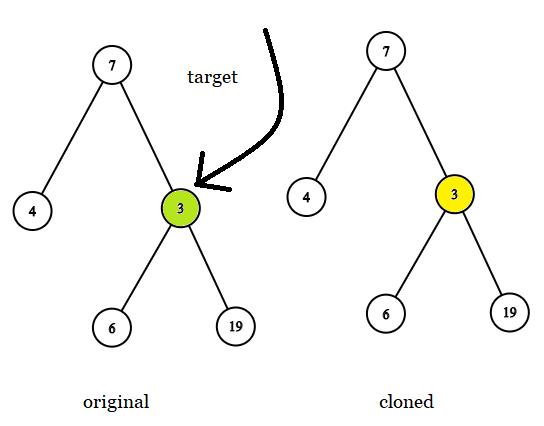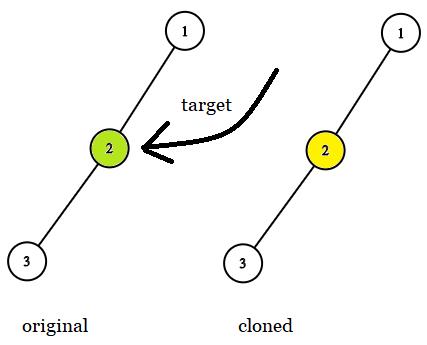算法1379. 找出克隆二叉树中的相同节点(多语言实现)
Posted 二当家的白帽子
tags:
篇首语:本文由小常识网(cha138.com)小编为大家整理,主要介绍了算法1379. 找出克隆二叉树中的相同节点(多语言实现)相关的知识,希望对你有一定的参考价值。
非常感谢你阅读本文~
欢迎【👍点赞】【⭐收藏】【📝评论】~
放弃不难,但坚持一定很酷~
希望我们大家都能每天进步一点点~
本文由 二当家的白帽子:https://le-yi.blog.csdn.net/ 博客原创~
文章目录
1379. 找出克隆二叉树中的相同节点:
给你两棵二叉树,原始树 original 和克隆树 cloned,以及一个位于原始树 original 中的目标节点 target。
其中,克隆树 cloned 是原始树 original 的一个 副本 。
请找出在树 cloned 中,与 target 相同 的节点,并返回对该节点的引用(在 C/C++ 等有指针的语言中返回 节点指针,其他语言返回节点本身)。
注意:
- 你 不能 对两棵二叉树,以及
target节点进行更改。 - 只能 返回对克隆树
cloned中已有的节点的引用。
进阶:如果树中允许出现值相同的节点,你将如何解答?
样例 1:

输入:
tree = [7,4,3,null,null,6,19], target = 3
输出:
3
解释:
上图画出了树 original 和 cloned。target 节点在树 original 中,用绿色标记。答案是树 cloned 中的黄颜色的节点(其他示例类似)。
样例 2:

输入:
tree = [7], target = 7
输出:
7
样例 3:

输入:
tree = [8,null,6,null,5,null,4,null,3,null,2,null,1], target = 4
输出:
4
样例 4:

输入:
tree = [1,2,3,4,5,6,7,8,9,10], target = 5
输出:
5
样例 5:

输入:
tree = [1,2,null,3], target = 2
输出:
2
提示:
- 树中节点的数量范围为 [1, 104] 。
- 同一棵树中,没有值相同的节点。
target节点是树original中的一个节点,并且不会是null。
分析
- 这道算法题的需要简单翻译一下,三个参数:第一个参数
original是原树;第二个参数cloned是第一个参数的克隆拷贝;第三个参数target是我们要找到的节点,它是第一个参数original中的一个节点,需要找到并返回第二个参数cloned里对应的节点。 - 提示中说同一棵树中,没有值相同的节点。所以有的小伙伴可能觉得第一个参数非常多余,二当家也这么觉得。我们直接遍历第二个参数
cloned,直到找到和第三个参数target值相同的节点并返回就可以了。 - 其实第一个参数在 进阶 挑战里就有用了,如果树中允许出现值相同的节点,那就不能用值去判断是相同节点了。
- 这时候就需要用到第一个参数
original,因为第三个参数target是原树中的一个节点,所以我们可以直接根据地址判断是否是相同节点。 - 第二个参数
cloned是第一个参数的克隆拷贝,所以它们具有相同结构,我们只要按照相同顺序同时遍历原树和克隆树,就可以找到答案。
题解
java
非递归遍历
/**
* Definition for a binary tree node.
* public class TreeNode
* int val;
* TreeNode left;
* TreeNode right;
* TreeNode(int x) val = x;
*
*/
class Solution
public final TreeNode getTargetCopy(final TreeNode original, final TreeNode cloned, final TreeNode target)
Deque<TreeNode> stack = new LinkedList<>();
TreeNode node = original;
TreeNode clonedNode = cloned;
while (node != null || !stack.isEmpty())
if (node != null)
if (node == target)
return clonedNode;
stack.push(clonedNode);
stack.push(node);
node = node.left;
clonedNode = clonedNode.left;
else
node = stack.pop().right;
clonedNode = stack.pop().right;
return null;
递归遍历
/**
* Definition for a binary tree node.
* public class TreeNode
* int val;
* TreeNode left;
* TreeNode right;
* TreeNode(int x) val = x;
*
*/
class Solution
public final TreeNode getTargetCopy(final TreeNode original, final TreeNode cloned, final TreeNode target)
if (cloned == null
|| original == target)
return cloned;
TreeNode ans = getTargetCopy(original.left, cloned.left, target);
if (ans == null)
ans = getTargetCopy(original.right, cloned.right, target);
return ans;
c++
/**
* Definition for a binary tree node.
* struct TreeNode
* int val;
* TreeNode *left;
* TreeNode *right;
* TreeNode(int x) : val(x), left(NULL), right(NULL)
* ;
*/
class Solution
public:
TreeNode* getTargetCopy(TreeNode* original, TreeNode* cloned, TreeNode* target)
if (cloned == nullptr
|| original == target)
return cloned;
TreeNode* ans = getTargetCopy(original->left, cloned->left, target);
if (ans == nullptr)
ans = getTargetCopy(original->right, cloned->right, target);
return ans;
;
python
# Definition for a binary tree node.
# class TreeNode:
# def __init__(self, x):
# self.val = x
# self.left = None
# self.right = None
class Solution:
def getTargetCopy(self, original: TreeNode, cloned: TreeNode, target: TreeNode) -> TreeNode:
if cloned is None or original == target:
return cloned
ans = self.getTargetCopy(original.left, cloned.left, target)
if ans is None:
ans = self.getTargetCopy(original.right, cloned.right, target)
return ans

原题传送门:https://leetcode-cn.com/problems/find-a-corresponding-node-of-a-binary-tree-in-a-clone-of-that-tree/
以上是关于算法1379. 找出克隆二叉树中的相同节点(多语言实现)的主要内容,如果未能解决你的问题,请参考以下文章
数据结构与算法之深入解析“找出克隆二叉树中的相同节点”的求解思路与算法示例
算法leetcode2331. 计算布尔二叉树的值(多语言实现)